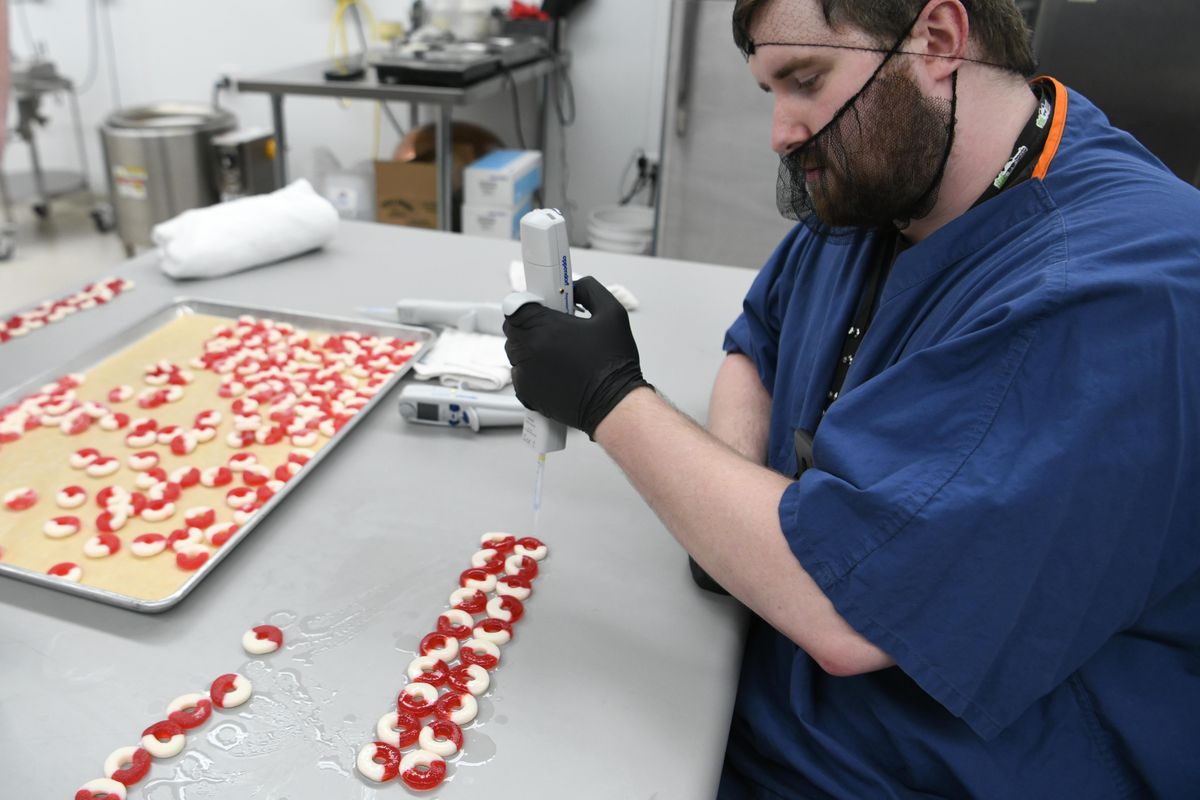Candy crushed: Washington regulators crack down on marijuana sweets they say are too appealing to kids

Spokane marijuana industry professionals and advocates said this week they were blindsided by a change that will outlaw certain types of infused candies beginning next year.
But state officials say that they’re combating the appearance of products on store shelves that will catch the eyes of children and the under-21 crowd, in violation of rules that have been on the books since 2013.
The Washington Liquor and Cannabis Board announced at its regular board meeting last week that it would re-evaluate edible products that had previously been approved for sale, over concerns products had begun appearing on shelves that were overly enticing to kids. State regulators are calling for marijuana processors to cease the manufacture of hard and “gummy” candies, including fruit chews, as they likely won’t be allowed when new enforcement takes effect Jan. 1.
“Some products that are on the marketplace now had been approved by some point by us,” said Brian Smith, a spokesman for the Liquor and Cannabis Board. “They look a lot different on the shelves, and we had some complaints about it.”
Ending such sales would bite into a relatively small portion of marijuana sales statewide. The board reported that 9 percent of pot sales in Washington (which totaled nearly $1.4 billion statewide in 2017) are edible products, and the types of candy targeted by the board make up only a portion of those sales. But the products do provide one of only a few potentially lucrative revenue streams to an industry that is flush with weed, said Chris Marr, a former state legislator and board member who now consults with businesses in the fledgling industry.
“Processors are generating at the margin right now,” Marr said. “A lot of folks who actually produce these products, it’s an existential question for a lot of them.”
Others have made major investments in their processing plants that allow them to produce candies, among other edible products that won’t necessarily be subject to stricter standards. Rob McKinley, co-founder and chief executive of Grow Op Farms, upgraded the kitchen in his Spokane Valley processing plant to produce the Hot Sugar line of candied edibles. McKinley said rules would likely eliminate some of his most profitable products, but it’ll hurt smaller operations even more.
“It doesn’t really affect us as much, even if we have to get rid of some products,” McKinley said. “But some of the smaller processors, they don’t have any other business.”
The main hit will be in packaging, McKinley said. Grow Op has already ordered a substantial amount of packaging for future candy products that will have to be disposed of or sold if the rule goes through.
Individual sellers will be able to appeal a ruling that their product can no longer be sold for being “especially appealing to children.” The rule has actually been on the books for the past five years, but regulators acknowledged last week they’d approved products that shouldn’t have been on the shelf in the first place.
“Most of these products do have a sister in the non-THC market,” Smith said.
Kevin Oliver, executive director of the Washington chapter of the National Organization for the Reform of Marijuana Laws, said the sudden nature of the announcement, and the targeting specifically of candy and not other products that would also appeal to children, made the liquor board’s actions suspect.
“From my perspective, it’s very interesting that everyone, anyone outside of the (cannabis board) for some reason, is surprised by this,” Oliver said. “Everyone is surprised by this.”
Smith acknowledged that the board had received some complaints from legal businesses. The agency sent out a follow-up notification Friday clarifying that not all edibles would be targeted for removal from store shelves, and that no rules were changing on Jan. 1, just enforcement of existing rules.
Still, industry groups are expected to push back when the board asks for input later this month. Mr. Wholesale, a processor on the West Plains, has been selling its Chill Pillz hard candies for the past four years, said Branden Perina, senior extractor for the business.
“We’re hoping that with the hearing on the 16th, it’s not going to be them listening to us complain for a little bit and then do what they want,” Perina said. “We’re hoping to gain some headway with them.”
Mr. Wholesale could shift to other types of edible products, including cookies and baked goods that could pass inspection if they don’t include frosting or other decorations appealing to children. But Perina said those products don’t have the same consistency as hard candies.
“You might have a batch of 200 cookies, depending on which cookie you got tested, you’d have different potency,” he said. “With gummies, they’re far more consistent.”
The loss of a candy market may mean less for the state’s eastern side than western Washington, where marijuana tourism has taken off in a bigger way than in Spokane, said Ryan Burks, a manager at the Cannabis & Glass dispensary location on Francis Avenue.
“We definitely have much lower edible demand from the customers,” said Burks. “It’s much lower than our other products.”
But edibles are a popular choice among a certain section of the market: Medical patients, who don’t want to smoke the product, said Oliver.
“They don’t smoke weed; they eat a couple pieces of chocolate and then they’re happy,” said Oliver. He also said, through work with NORML and other industry advocacy organizations, that he’s heard the rule changes will significantly affect female-owned businesses in the state specializing in the candy market.
The Liquor and Cannabis Board will hold an online webinar to discuss the re-evaluation and licensing period on Oct. 16. Existing candy products violating the state’s “especially appealing to children” rule may be sold through April 3, but will be prohibited afterward.